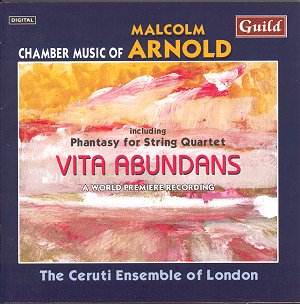Malcolm ARNOLD (b. 1921)
String Quartet No.1 Op.23 (1949)
String Quartet No.2 Op.118 (1975)
Quintet op.7 (1944, rev. 1960)
Phantasy for String Quartet "Vita Abundans" (1941)
 The Ceruti Ensemble of
London
The Ceruti Ensemble of
London
Recorded : London, November 2000
 GUILD MUSIC GHCD 7216
(70:37)
GUILD MUSIC GHCD 7216
(70:37)
AmazonUK
AmazonUS
Amazon
recommendations

Malcolm Arnold's chamber music is an important aspect of his large output
and reveals a more intimate, complex and, at times, secret composer. His
two string quartets are among the most compelling works he ever penned. They
were written during crucial periods of the composer's life. The String
Quartet No.l Op.23, completed in 1949, is a deeply personal utterance,
though a quite uncharacteristic one, at least in stylistic terms. As I have
already remarked elsewhere, the First String Quartet belongs to a group of
works (Symphony for Strings Op.13 (1946), the Violin Sonata No.l Op.15 (
1947), the Viola Sonata Op. 17 ( 1947) and the First Clarinet Concerto Op.
20 ( 1948)) which show Arnold at his most experimental and seemingly going
through a "phase of Bartók-worship", to quote the late Christopher
Palmer's very apt phrase. Indeed the music here looks to Berg or Bartók
rather than to Walton or Vaughan Williams. It has a rather unusual stringency
and tension hardly relieved (if at all) during the last bars of the Finale;
no easy work but one of Arnold's most important and personal achievements.
The String Quartet No.2 Op.118 was completed in 1975 during Arnold's
Dublin period which by all accounts was a most harrowing one. Other works
of that period include the Symphony No.7 Op.113, one of Arnold's most violent
pieces, the enigmatic Fantasy on a Theme of John Field Op.116 and the Clarinet
Concerto No.2 Op.115. All these works have much in common: the music is often
elliptical, doom-laden, unpredictable, bleak (especially so in the slow
movements). The Second String Quartet is no exception. The troubled, ambiguous
first movement finds no resolution. The following Scherzo is still more
enigmatic: it opens with some sort of cadenza for violin, the material of
which is totally alien to the rest of the work. This then turns into some
folk-like Irish jig angrily assaulted by the other strings. No dialogue
whatsoever here. The slow movement, a darkly oppressive meditation, again
has a hymn-like episode unrelated to the rest of the music. Finally the last
movement partly succeeds in dispelling the prevailing angry mood, though
victory with Malcolm Arnold is neither easily approached nor complete.
The much earlier Quintet Op.7 of 1944 (flute, violin, viola, horn
and bassoon) is one of the works written for some of Arnold's LPO colleagues.
This accounts for the somewhat unusual instrumental combination. A lighter
work, it is comparable with the celebrated Three Shanties Op.4 of 1943. The
outer movements are mainly light-hearted, though the last one is unresolved
at the end, whereas the slow section is rather more tense. In its quite short
span, the Quintet Op. 7 is a remarkable example of the all-pervading ambiguity
in Arnold's music.
The novelty here is the Phantasy for String Quartet "Vita Abundans"
written in 1941. This was awarded the second prize of the Cobbett competition
that year. It is a quite remarkable piece of music in which Arnold fully
demonstrates his mastery of variation form. Its six contrasted sections follow
each other effortlessly, with an extraordinary musical logic and sureness
of touch, and also a good deal of invention. One can but wonder why this
beautiful piece remained unheard for more than fifty years.
The Ceruti Ensemble of London is a young group of gifted players and this
is their first recording. Their readings of these pieces are really very
fine. They play with assurance (though I spotted a momentary hesitation at
the very beginning of the First String Quartet), commitment and - more
importantly - with affection. There is not much to choose between their readings
of the string quartets and those of the McCapra Quartet (on CHANDOS CHAN
9112 released in 1993). The only problem with the CHANDOS release is its
short playing time. The present release, which is also an appropriate tribute
to Arnold on his 80th birthday, is a must for all "Arnoldians" who will want
to hear the splendid, long-neglected Phantasy Quartet. Unreservedly recommended.
Hubert Culot
Visit the Arnold Web-site

